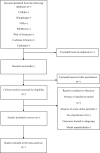Risk prediction models for non-suicidal self-injurious behavior in patient with depressive disorder: a protocol for systematic review and mata-analyisis
- PMID: 40245057
- PMCID: PMC12005486
- DOI: 10.1371/journal.pone.0321561
Risk prediction models for non-suicidal self-injurious behavior in patient with depressive disorder: a protocol for systematic review and mata-analyisis
Abstract
Introduction: Non-suicidal self-injury (NSSI) frequently occurs in patients with depressive disorder and often presents as burning or severe scratching. NSSI plays a crucial role in increasing the risk of self-injury in individuals with depressive disorder. Despite the progressive development of various risk prediction models to identify NSSI, there are significant differences in their overall predictive performance. This systematic review aims to evaluate the quality and applicability of these models in predicting NSSI among patients with depressive disorders.
Methods and analysis: A systematic review with meta-analysis was conducted targeting patients with depressive disorder. We included studies on risk prediction models for NSSI behavior in this population that were developed and published. The primary outcome was NSSI behavior as reported by the prediction models. Predictive variables were measured at different disease stages in patients with depressive disorder, with no specific limitations on the prediction horizon. The intended use of the risk prediction model is to individualize the prediction of NSSI behavior of in patients with depressive disorder, thus facilitating the implementation of preventive measures to avoid adverse events. Databases, including China National Knowledge Infrastructure (CNKI), Wanfang Database, VIP Database, PubMed, Web of Science, Medline, and Embase, were searched from inception to March 2024 by two independently reviewers. Data extraction followed the guidelines outlined in the Checklist for Critical Appraisal and Data Extraction for Systematic Reviews of Prediction Modelling Studies (CHARMS). The risk of bias and applicability of the included studies were assessed using PROBAST. Descriptive statistical methods were employed to summarize the characteristics of the NSSI models and meta-analysis for model validation was conducted using Stata software.
Conclusion: The study will systematically review the prediction models for NSSI in patients with depressive disorders to enhance clinical practice. This research will also assist clinicians in selecting effective prediction models for NSSI in this patient population.
Copyright: © 2025 Huang et al. This is an open access article distributed under the terms of the Creative Commons Attribution License, which permits unrestricted use, distribution, and reproduction in any medium, provided the original author and source are credited.
Conflict of interest statement
The authors have declared that no competing interests exist.
Figures
Similar articles
-
Potential mechanisms of non-suicidal self-injury (NSSI) in major depressive disorder: a systematic review.Gen Psychiatr. 2023 Aug 29;36(4):e100946. doi: 10.1136/gpsych-2022-100946. eCollection 2023. Gen Psychiatr. 2023. PMID: 37655114 Free PMC article.
-
Non-pharmacological interventions for depressive disorder in patients after traumatic brain injury: A protocol for a systematic review and network meta-analysis.Medicine (Baltimore). 2020 Sep 25;99(39):e22375. doi: 10.1097/MD.0000000000022375. Medicine (Baltimore). 2020. PMID: 32991457 Free PMC article.
-
[When is self-injury nonsuicidal? Reviewing the relationship between suicial and nonsuicidal self-injury].Psychiatr Hung. 2020;35(4):476-483. Psychiatr Hung. 2020. PMID: 33263297 Hungarian.
-
Risk prediction models for disability in older adults: a systematic review and critical appraisal.BMC Geriatr. 2024 Oct 2;24(1):806. doi: 10.1186/s12877-024-05409-z. BMC Geriatr. 2024. PMID: 39358747 Free PMC article.
-
The pooled prevalence and influential factors of non-suicidal self-injury in non-clinical samples during the COVID-19 outbreak: A meta-analysis.J Affect Disord. 2023 Dec 15;343:109-118. doi: 10.1016/j.jad.2023.09.036. Epub 2023 Oct 5. J Affect Disord. 2023. PMID: 37802326 Review.
References
-
- Nock MK. Self-Injury. Annu Rev. Clin. Psychol. 2010;6:339–63. - PubMed
MeSH terms
LinkOut - more resources
Full Text Sources
Medical


